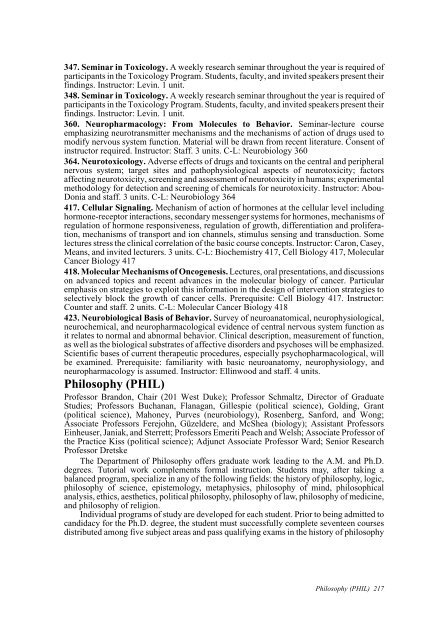2005-06 - Office of the Registrar - Duke University
2005-06 - Office of the Registrar - Duke University
2005-06 - Office of the Registrar - Duke University
You also want an ePaper? Increase the reach of your titles
YUMPU automatically turns print PDFs into web optimized ePapers that Google loves.
347. Seminar in Toxicology. A weekly research seminar throughout <strong>the</strong> year is required <strong>of</strong><br />
participants in <strong>the</strong> Toxicology Program. Students, faculty, and invited speakers present <strong>the</strong>ir<br />
findings. Instructor: Levin. 1 unit.<br />
348. Seminar in Toxicology. A weekly research seminar throughout <strong>the</strong> year is required <strong>of</strong><br />
participants in <strong>the</strong> Toxicology Program. Students, faculty, and invited speakers present <strong>the</strong>ir<br />
findings. Instructor: Levin. 1 unit.<br />
360. Neuropharmacology: From Molecules to Behavior. Seminar-lecture course<br />
emphasizing neurotransmitter mechanisms and <strong>the</strong> mechanisms <strong>of</strong> action <strong>of</strong> drugs used to<br />
modify nervous system function. Material will be drawn from recent literature. Consent <strong>of</strong><br />
instructor required. Instructor: Staff. 3 units. C-L: Neurobiology 360<br />
364. Neurotoxicology. Adverse effects <strong>of</strong> drugs and toxicants on <strong>the</strong> central and peripheral<br />
nervous system; target sites and pathophysiological aspects <strong>of</strong> neurotoxicity; factors<br />
affecting neurotoxicity, screening and assessment <strong>of</strong> neurotoxicity in humans; experimental<br />
methodology for detection and screening <strong>of</strong> chemicals for neurotoxicity. Instructor: Abou-<br />
Donia and staff. 3 units. C-L: Neurobiology 364<br />
417. Cellular Signaling. Mechanism <strong>of</strong> action <strong>of</strong> hormones at <strong>the</strong> cellular level including<br />
hormone-receptor interactions, secondary messenger systems for hormones, mechanisms <strong>of</strong><br />
regulation <strong>of</strong> hormone responsiveness, regulation <strong>of</strong> growth, differentiation and proliferation,<br />
mechanisms <strong>of</strong> transport and ion channels, stimulus sensing and transduction. Some<br />
lectures stress <strong>the</strong> clinical correlation <strong>of</strong> <strong>the</strong> basic course concepts. Instructor: Caron, Casey,<br />
Means, and invited lecturers. 3 units. C-L: Biochemistry 417, Cell Biology 417, Molecular<br />
Cancer Biology 417<br />
418. Molecular Mechanisms <strong>of</strong> Oncogenesis. Lectures, oral presentations, and discussions<br />
on advanced topics and recent advances in <strong>the</strong> molecular biology <strong>of</strong> cancer. Particular<br />
emphasis on strategies to exploit this information in <strong>the</strong> design <strong>of</strong> intervention strategies to<br />
selectively block <strong>the</strong> growth <strong>of</strong> cancer cells. Prerequisite: Cell Biology 417. Instructor:<br />
Counter and staff. 2 units. C-L: Molecular Cancer Biology 418<br />
423. Neurobiological Basis <strong>of</strong> Behavior. Survey <strong>of</strong> neuroanatomical, neurophysiological,<br />
neurochemical, and neuropharmacological evidence <strong>of</strong> central nervous system function as<br />
it relates to normal and abnormal behavior. Clinical description, measurement <strong>of</strong> function,<br />
as well as <strong>the</strong> biological substrates <strong>of</strong> affective disorders and psychoses will be emphasized.<br />
Scientific bases <strong>of</strong> current <strong>the</strong>rapeutic procedures, especially psychopharmacological, will<br />
be examined. Prerequisite: familiarity with basic neuroanatomy, neurophysiology, and<br />
neuropharmacology is assumed. Instructor: Ellinwood and staff. 4 units.<br />
Philosophy (PHIL)<br />
Pr<strong>of</strong>essor Brandon, Chair (201 West <strong>Duke</strong>); Pr<strong>of</strong>essor Schmaltz, Director <strong>of</strong> Graduate<br />
Studies; Pr<strong>of</strong>essors Buchanan, Flanagan, Gillespie (political science), Golding, Grant<br />
(political science), Mahoney, Purves (neurobiology), Rosenberg, Sanford, and Wong;<br />
Associate Pr<strong>of</strong>essors Ferejohn, Güzeldere, and McShea (biology); Assistant Pr<strong>of</strong>essors<br />
Einheuser, Janiak, and Sterrett; Pr<strong>of</strong>essors Emeriti Peach and Welsh; Associate Pr<strong>of</strong>essor <strong>of</strong><br />
<strong>the</strong> Practice Kiss (political science); Adjunct Associate Pr<strong>of</strong>essor Ward; Senior Research<br />
Pr<strong>of</strong>essor Dretske<br />
The Department <strong>of</strong> Philosophy <strong>of</strong>fers graduate work leading to <strong>the</strong> A.M. and Ph.D.<br />
degrees. Tutorial work complements formal instruction. Students may, after taking a<br />
balanced program, specialize in any <strong>of</strong> <strong>the</strong> following fields: <strong>the</strong> history <strong>of</strong> philosophy, logic,<br />
philosophy <strong>of</strong> science, epistemology, metaphysics, philosophy <strong>of</strong> mind, philosophical<br />
analysis, ethics, aes<strong>the</strong>tics, political philosophy, philosophy <strong>of</strong> law, philosophy <strong>of</strong> medicine,<br />
and philosophy <strong>of</strong> religion.<br />
Individual programs <strong>of</strong> study are developed for each student. Prior to being admitted to<br />
candidacy for <strong>the</strong> Ph.D. degree, <strong>the</strong> student must successfully complete seventeen courses<br />
distributed among five subject areas and pass qualifying exams in <strong>the</strong> history <strong>of</strong> philosophy<br />
Philosophy (PHIL) 217









